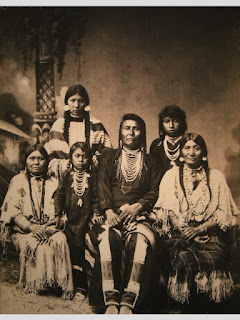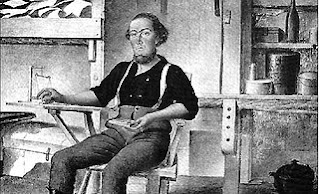Did It Happen: Chief Joseph's Surrender Speech, 1877
The Nez Perce retreat was a grueling one. When Joseph and his people finally surrendered after a standoff of several days at the Battle of Bear Paw on October 5, 1877, winter was already setting in. Most of his war chiefs and many warriors had died. Other members of the tribe and their families were scattered in the wilderness, with no food or shelter to protect them against a brutal Montana winter. Joseph asked for a peace parley and found himself confronted by General Nelson A. Miles, whose patience with Natives who had left their reservations was known to be thin. At the parley, Joseph supposedly made a speech, as follows:
Tell General Howard I know his heart. What he told me before, I have it in my heart. I am tired of fighting. Our chiefs are killed. Looking Glass is dead, Too-Hul-Hul-Sote is dead. The old men are all dead. It is the young men who say yes or no. He who led on the young men is dead. It is cold, and we have no blankets. The little children are freezing to death. My people, some of them, have run away to the hills, and have no blankets, no food. No one knows where they are, perhaps freezing to death. I want to have time to look for my children, to see how many I can find. Maybe I shall find them among the dead. Hear me, my chiefs! I am tired, my heart is sick and sad. From where the sun now stands, I will fight no more, forever. (Source, Wikipedia).
Great speech and a perfect summation of the facts as they then stood, but did it happen? The aid who took notes of the surrender proceedings was Lt. Charles Erskine Scott Wood, who later became an attorney and a poet. At the time, his notation only read, 'here insert Joseph's reply to the demand for surrender', meaning that he hadn't taken any simultaneous notes regarding what Joseph actually said. Nor is there any other record of what he actually said. Did Charles Wood make the whole thing up. American history tends to make celebrities of conquered chiefs and warriors. Osceola and Tecumseh to Cochise, Sitting Bull and later Geronimo were not the only ones. Joseph would come in for his share of fame, his ability to lead his people so long in evading capture over such rough country earning comparisons to Napoleon's retreat from Russia in 1814. Over time, historians have sought to set Joseph in his context as an influential leader, but not as a war chief, indicating that others, including Looking Glass, bore a greater share of credit for the movements of their people during this time. In this context, Joseph's speech becomes a bit suspect. Maybe he didn't say what Wood said he said, after all.
Those who doubt the speech's authenticity and Joseph's role among his people forget several basic facts. Nez Perce men were trained to be hunters and warriors from boyhood. While leadership may have been compartmentalized, most men would have known how to fight and go to ground when threatened. And Joseph, although not a war leader, was still a leader among his people. They had lost several battlefield leaders, including Looking Glass, who might have help them get that last forty miles across to Canada. In the face of an enemy disinclined to be generous, it would take a leader of Joseph's skill in calming a situation to both persuade his people to surrender and to return under guard to whatever awaited them. It would also take that same leader to urge the White men to have some empathy and compassion on their situation. Native leaders were also skilled diplomats and orators. They had to be to keep their place in the tribal hierarchy. Joseph maintained his leadership of his people for years after the retreat, indicating that, whatever he said, they still respected him. Even though they were eventually deported for several years to Kansas and later Oklahoma, Joseph's place in his people's affections remained high.
Wood later became a lawyer, a politician, a poet and an author. Perhaps he embellished Joseph's words. No one will know for sure. However, in one simple paragraph Joseph, if indeed he did say these words, stated his people's situation, begged his warriors to stop the fight, asked consideration from their captors and made a simple declaration that does ring true, "from where the sun now stands, I will fight no more forever." It happened.
Tell General Howard I know his heart. What he told me before, I have it in my heart. I am tired of fighting. Our chiefs are killed. Looking Glass is dead, Too-Hul-Hul-Sote is dead. The old men are all dead. It is the young men who say yes or no. He who led on the young men is dead. It is cold, and we have no blankets. The little children are freezing to death. My people, some of them, have run away to the hills, and have no blankets, no food. No one knows where they are, perhaps freezing to death. I want to have time to look for my children, to see how many I can find. Maybe I shall find them among the dead. Hear me, my chiefs! I am tired, my heart is sick and sad. From where the sun now stands, I will fight no more, forever. (Source, Wikipedia).
Great speech and a perfect summation of the facts as they then stood, but did it happen? The aid who took notes of the surrender proceedings was Lt. Charles Erskine Scott Wood, who later became an attorney and a poet. At the time, his notation only read, 'here insert Joseph's reply to the demand for surrender', meaning that he hadn't taken any simultaneous notes regarding what Joseph actually said. Nor is there any other record of what he actually said. Did Charles Wood make the whole thing up. American history tends to make celebrities of conquered chiefs and warriors. Osceola and Tecumseh to Cochise, Sitting Bull and later Geronimo were not the only ones. Joseph would come in for his share of fame, his ability to lead his people so long in evading capture over such rough country earning comparisons to Napoleon's retreat from Russia in 1814. Over time, historians have sought to set Joseph in his context as an influential leader, but not as a war chief, indicating that others, including Looking Glass, bore a greater share of credit for the movements of their people during this time. In this context, Joseph's speech becomes a bit suspect. Maybe he didn't say what Wood said he said, after all.
Those who doubt the speech's authenticity and Joseph's role among his people forget several basic facts. Nez Perce men were trained to be hunters and warriors from boyhood. While leadership may have been compartmentalized, most men would have known how to fight and go to ground when threatened. And Joseph, although not a war leader, was still a leader among his people. They had lost several battlefield leaders, including Looking Glass, who might have help them get that last forty miles across to Canada. In the face of an enemy disinclined to be generous, it would take a leader of Joseph's skill in calming a situation to both persuade his people to surrender and to return under guard to whatever awaited them. It would also take that same leader to urge the White men to have some empathy and compassion on their situation. Native leaders were also skilled diplomats and orators. They had to be to keep their place in the tribal hierarchy. Joseph maintained his leadership of his people for years after the retreat, indicating that, whatever he said, they still respected him. Even though they were eventually deported for several years to Kansas and later Oklahoma, Joseph's place in his people's affections remained high.
Wood later became a lawyer, a politician, a poet and an author. Perhaps he embellished Joseph's words. No one will know for sure. However, in one simple paragraph Joseph, if indeed he did say these words, stated his people's situation, begged his warriors to stop the fight, asked consideration from their captors and made a simple declaration that does ring true, "from where the sun now stands, I will fight no more forever." It happened.




Comments
Post a Comment